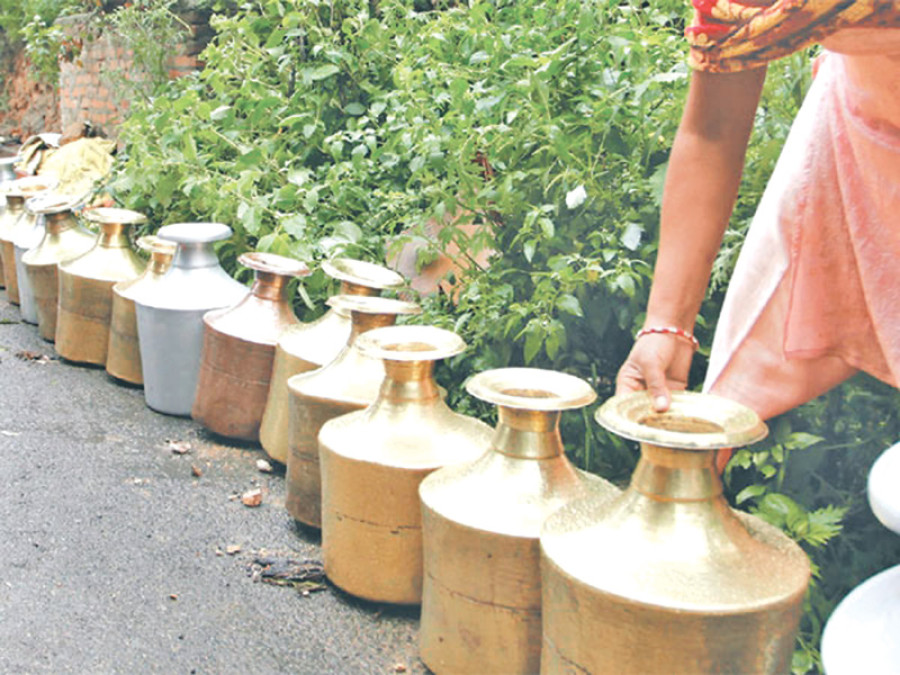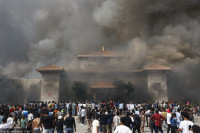Valley
KUKL in a shambles as water is channelled from Melamchi
While the first phase of the much-awaited Melamchi Drinking Water Project nears completion, there are renewed fears over the ability of the drinking water supplier to deliver quality service,
Rupak D. Sharma
While the first phase of the much-awaited Melamchi Drinking Water Project nears completion, there are renewed fears over the ability of the drinking water supplier to deliver quality service, thanks to some of the company board members who do not make decisions on time, resort to nepotism and display high-handed conduct.
Come September 2017, 170 million litres of water is expected to flow every day from the Melamchi river in Sindhupalchok to Kathmandu Valley, where many taps currently emit air rather than water.
The arrival of this water is not only being eagerly awaited by millions of residents of the water-starved Valley, but also by the financially-troubled Kathmandu Upatyaka Khanepani Limited (KUKL), the sole distributor in the Valley.
“We hope inauguration of the Melamchi project will raise water demand, which is pent-up at the moment, increasing the cash flow of the company,” KUKL General Manager Mahesh Prasad Bhattarai told the Post.
But the question is: Can KUKL—established under the public private partnership—tap this opportunity?
Once assets of the Melamchi Drinking Water Project are handed over to the KUKL, the size of the company will also grow. To handle a bigger company, efficient and effective board of directors and management are necessary. Also, informed decisions need to be taken without wasting time. Currently, one of the major problems facing the company is delay in decision making by the board, which is preventing the management from executing various plans.
“For instance, we have been pushing the board to expedite the process of hiring people with technical background. Although candidates have been short-listed, we have not been able to hire them because the board is dragging its feet,” said Bhattarai.
The KUKL management is allowed to have a team of 1,207 employees. But the number of staff at the company currently hovers around 1,050, including those hired on daily-wage basis.
“The problem with this team is that most of the staffers are of non-technical background,” said Bhattarai.
Right after the restoration of democracy in 1990, most of the political parties used companies like the KUKL—which until December 2006 was a state-owned firm—as a platform to recruit their cronies. It is therefore not surprising that 70 percent of the KUKL employees are non-technical, with a majority of them working as accountants or administrative staff.
“The composition of technical and non-technical staff should have been the other way around, as we need more technicians to deal with works such as water treatment, network expansion, maintenance and system operation,” said Bhattarai, who is planning to increase the share of technical employees in the company to 60 percent of the workforce.
But again to make this change, the management needs the board’s approval.
The biggest problem facing the board, according to at least two sources with knowledge of the matter, is linked to Chairman Suresh Kumar Basnet, the former president of the Nepal Chamber of Commerce that holds 9 percent stake in the utility.
Basnet, who became the KUKL chairman in June 2014, “uses political influence to compel the board members to take decisions to suit his needs”, the sources said. “He even intervened in the general manager selection process and appointed his candidate as the management head.” This move was later declared inappropriate by the Supreme Court.
“The person deemed inappropriate by the Court for the post of general manager has now joined the board, and two of them are working in concert to serve vested interests and intervening in the process of hiring
management staff,” the sources said. Basnet is also said to have played a key role in making amendments to the company regulations, paving the way for the board chair to serve the organisation for an unlimited period of time. The provision was later removed. Now, the board chairman has to be shuffled during annual general meetings.
“Since the introduction of the provision, Basnet has not shown interest in holding the annual general meeting and disappears from office for long, further delaying the decision-making process,” the sources said. The company is yet to hold its annual meetings for fiscal years 2013-14, 2014-15 and 2015-16.
This has prevented the KUKL from taking crucial decisions like injecting fresh capital into the company, which currently has a negative net worth, the sources added.
This high-handed conduct was disliked by many board members since his appointment as chairman. This dislike later prompted a majority of board members to approve a no-confidence motion filed against Basnet in May 2015, relieving him from his duty.
Basnet then moved the erstwhile Patan Appeals Court, which backed the board’s decision. Basnet has since taken the case to the Supreme Court, where it is pending for almost one-and-a-half years.
Basnet could not be contacted as he is in Australia. He is expected to return home after one-and-a-half months.
Rajesh Kazi Shrestha, president of the Nepal Chamber of Commerce, which recommended Basnet for the job, did not want to comment on the matter.




 7.12°C Kathmandu
7.12°C Kathmandu











